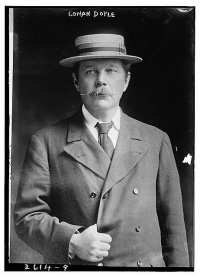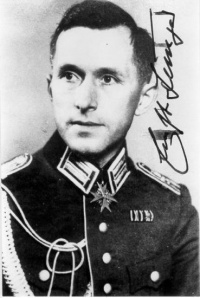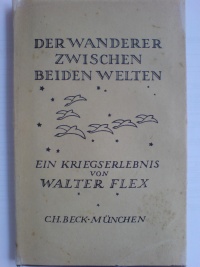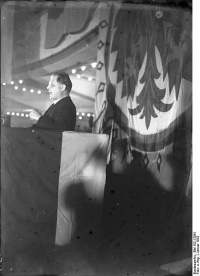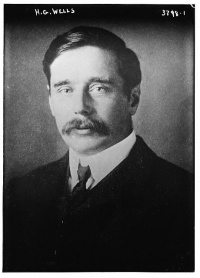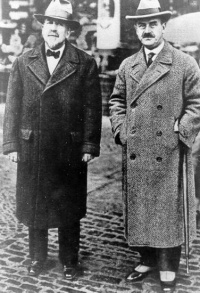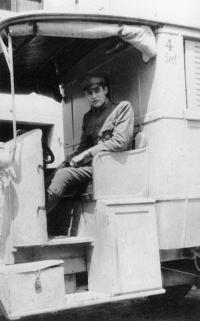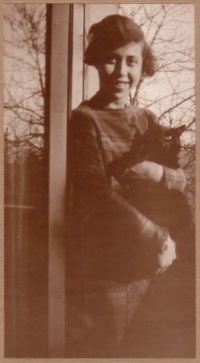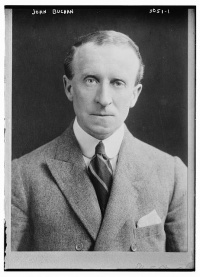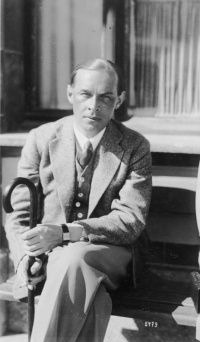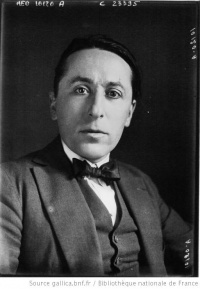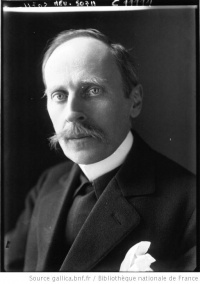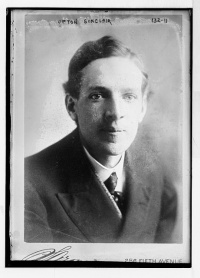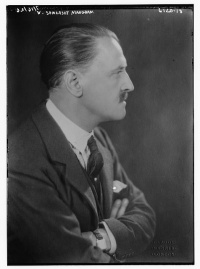Introduction↑
By the end of the 19th century, improvements in education and increased urbanisation had led to more widespread literacy, creating a new market of readers eager to consume all types of books. At the onset of the First World War in August 1914, a mass audience was present across Europe; a readership towards whom literature about the conflict could be disseminated. Of course not all nations had the same literary traditions; propaganda agencies varied from country to country, while cultural differences also informed the literature of the Great War. This article will focus on two main periods of war literature: 1914-1918, and the interwar years, between the First and Second World Wars. It will examine the influence of propagandists, and draw attention to the varied forms of literature across the nations. The interwar years witnessed a wealth of literary responses to the conflict, created by both former soldiers and civilians. Some of these have been forgotten, while others have achieved canonical status. Nevertheless, they had an impact. The outpouring of literary responses to the war was debated widely at the time, reflecting some of the key social and political issues of the era. These responses aid an understanding of the role such works played in the build-up to the Second World War.
Cultural Mobilization: 1914-1918↑
Literature played an important role across the combatant nations during the First World War. Although there were often similarities between different countries’ experiences, authors started writing about the war for many reasons. In Britain, literature about a possible war to come had been prominent since the publication of Sir George Chesney’s (1830-1895) The Battle of Dorking in 1871, soon after the defeat of France in the Franco-Prussian War. There followed a plethora of imagined invasion literature published in the years before 1914. From the early 1900s, the press baron Alfred Charles William Harmsworth, Lord Northcliffe’s (1865-1922) publications ensured that anti-German sentiment was a dominant feature of popular fiction, newspapers and magazines, as tensions rose on the European continent. Similar material was appearing outside Britain. The French writer Émile Driant (1855-1916), writing under the pseudonym Capitaine Danrit, wrote many guerre imaginaire (imaginary war) novels. He explored a future war with Germany in La Guerre de demain (The War of Tomorrow: 1888), and a conflict with Britain in Guerre fatale: France-Angleterre (Fatal War: France-England: 1902). Driant was recalled to the army when war broke out in 1914. He attained the rank of Lieutenant-Colonel, and was killed at Verdun in 1916. These imaginings of future wars were extremely popular. Their warnings certainly contributed to a climate in which people were anticipating war in Europe, long before the events in Sarajevo in 1914.
At the onset of war, British propagandists recognised the importance of literature as a means of spreading information. On 2 September 1914, the writer and Liberal Member of Parliament Charles Masterman (1874-1927), head of the newly formed War Propaganda Bureau (WPB), invited twenty-five prominent writers to the centre of operations for the British government’s war propaganda machine at Wellington House, London. Among the literary luminaries who attended were H.G. Wells (1866-1946), Thomas Hardy (1840-1928), J.M. Barrie (1860-1937), G.K. Chesterton (1874-1936), Arnold Bennett (1867-1931) and Arthur Conan Doyle (1859-1930). Ostensibly asked to discuss the use of literature in propagandising the war, many of these writers went on to produce works supporting the British war effort. Indeed, on 18 September 1914, fifty-three significant British writers signed a document supporting Britain’s decision to go to war. This Authors’ Manifesto was published in the New York Times.[1]
Much of the work of Wellington House came in the form of pamphlets and articles, rather than literature. Authors were sent to the Western Front to report on events, although lack of information often resulted in unrealistic representations.[2] Nevertheless, much fiction was also generated. Conan Doyle, for example, wrote one final propagandistic story about Sherlock Holmes ("His Last Bow": 1917). William Le Queux (1864-1927), one of the most famous proponents of invasion literature before 1914, produced propaganda stories during the war, as did such genre writers as E. Philips Oppenheim (1866-1946) and Edgar Wallace (1875-1932), who produced tales of espionage and adventure. One of Wells’ most famous works, Mr Britling Sees It Through (1916), achieved great success in both Britain and the United States, giving international readers a greater sense of civilian life in Britain during the First World War. This was not an official work of propaganda, and not all writers were products of Wellington House. Indeed, other writers were desperate to support the British war effort, and some produced work of such zealous jingoism that they were frowned upon by the WPB.[3] Others were critical of the function of propaganda. Arthur Machen (1863-1947)’s The Terror (1916), for example, satirised the speculative nature of the press during the First World War. This tale of animals rising against mankind as they sacrificed their humanity on the barbarous Western Front was a response to the misappropriation by propagandists of his earlier story, "The Bowmen" (1914).
The line between propagandist and author often became blurred during the conflict. In 1917, John Buchan (1875-1940) was appointed as director of the new Department of Information. Buchan had been writing about the war from its beginning. Detailed accounts of battles appeared in the adventure stories Greenmantle (1916), and Mr Standfast (1919), sequels to the phenomenally successful thriller The Thirty-Nine Steps (1915). Like many of the other wartime authors/propagandists, Buchan was useful because he had global appeal as a writer. Propaganda aimed at the United States was one of the most important aspects of Wellington House’s work. Famous British authors crossed the Atlantic to engage with American audiences and present Britain’s case for war in order to attract this potentially vital ally. Many American authors and publishers were also equally engaged in promoting the war effort.
Although the war may have seemed distant to the citizens of the United States, its impact was nevertheless felt. Furthermore, with its immense wealth and resources, the USA was the target of much Allied propaganda. As mentioned above, European writers with large American readerships were encouraged to help the Allied cause with their literary outputs. Moreover, American writers popular in Europe were reciprocating in the name of the war effort. Although the United States did not enter the war until April 1917, there was still support for the Allied cause before this date, particularly amongst some of the elites of the east coast who felt a European war might resolve some of the social problems they were experiencing at home.[4]
Upon the declaration of war by the United States, several important American novelists began to write about the events in Europe, many of whom had been involved in wartime propaganda since the conflict’s inception. In 1918, Edith Wharton (1862-1937), writer of such literary works as The House of Mirth (1905) and Ethan Frome (1911), wrote The Marne, a novella about Americans caught up in the invasion of France in 1914. A year later she wrote A Son at the Front, although it was not published until 1923. Wharton had visited France at the beginning of the war, and in 1915 published a collection of her journalism, Fighting France. From the beginning she had, like many in the European combatant nations, viewed the war as a clash of civilisation, and urged her fellow Americans to recognise the threat of Germany.[5]
Patriotic support for the war did not necessarily conform to a pro-British or French perspective. A product of the political left, Upton Sinclair’s (1878-1968) Jimmie Higgins (1918) supported the war, but saw the Allied capitalists as the lesser of two evils in the face of German barbarism.[6] The poet Carl Sandburg (1878-1967) wrote official propaganda during the war, as well as critiques of the government and the notion of war in the name of patriotism in the International Socialist Review. Such sentiments were not limited to American onlookers. In Britain, some socialists such as H.G. Wells enthusiastically espoused pro-war propaganda in the belief that out of the carnage of war would spring a new utopian society. The conflict was, in a phrase that would come back to haunt Wells, “the war to end all war”. Left-wing authors in other nations saw the war in similar ways.
American writing about the war, then, reflected a range of reactions to the conflict. Before the declaration of war in 1917, pro-war fiction was produced but did not necessarily reflect public sentiment. Even when the United States entered the fray, public support was not guaranteed, particularly in the face of reports from the fighting fronts. Their nation may have been directly involved, but for most Americans, as John T. Matthews has recognised, the war remained a “virtual phenomenon”.[7] Although many American soldier-writers would, in the 1920s and 1930s, use their wartime experience as the basis of novels and memoirs, it was in the nations of Europe that the impact of the war was being felt most strongly.
Of all the major combatant nations, France was perhaps the most affected by the Great War. With blood being shed on French soil, cultural mobilisation was widespread across French society. Moreover, because of the proximity of the fighting there was less need for an official gathering of literary luminaries to spread propaganda, as had been seen at Wellington House. The massive output of propaganda produced, which served to unite the French against the German invaders and strengthen the resolve of the soldiers, was frequently disseminated by members of society from all walks of life who believed in France’s cause. These people were not responding to a top-down directive from a centralised propaganda agency, although they often received establishment approval.[8] Indeed, the French President Raymond Poincaré (1860-1934) had urged the Académie Française to utilise “their pens and their words” to aid the nation.[9] Popular and acclaimed works of the war years included Gaspard (1915) by René Benjamin (1885-1948), Henry Malherbe’s (1886-1858) La Flamme au poing (Torch in Hand: 1917) and Georges Duhamel’s (1884-1966) Civilisation (1918), all of which won the prestigious Prix Goncourt. The interpretation of these works could often contradict the intentions of the author. Duhamel, who had signed up as an army surgeon at the beginning of the war, resented the view of his work as supporting the war effort; he had intended Civilisation and Vie des martyres (Lives of the Martyrs: 1917) to condemn the experience of the conflict.[10]
Given the immediacy of the war in France, many established French writers, including Henri Barbusse (1873-1935), Guillaume Apollinaire (1880-1918), and the aforementioned Duhamel, joined the French army upon the outbreak of war. These were not young men spurred on by youthful naivety; Barbusse was forty-one when he enlisted, while Apollinaire was thirty-four. Born in Rome to a Polish mother, Apollinaire’s patriotism reflected the zeal of the convert. In 1916 he, like his friend the Swiss-born poet Blaise Cendrars (1887-1961), attained French citizenship. Barbusse’s Le Feu (Under Fire), written in 1916 and translated into English a year later, was published after he had been invalided out of the French army. Its tone is often interpreted as reflecting a shift in his attitude to the war; Le Feu became controversial because of its criticism of the war, and its evocation of Barbusse’s new-found pacifist spirit. Yet many readers and critics at the time saw the novel as a work of naturalism, an almost factual report of what was happening in the trenches. Moreover, it espoused the notion that the war, however horrible, was necessary to defeat German militarism and pave the way for a new, egalitarian society. For many, Barbusse’s work continued the literary tradition of Emile Zola (1840-1902); his style was connected to a sense of national identity.[11]Le Feu also won the Prix Goncourt, and was a great popular success. Within two years of publication it had sold 300,000 copies.[12] Barbusse remained supportive of the war in general, while recognising its horrors. His rejection of the war came after 1918.[13] Barbusse was one of many soldier-writers in France during the Great War. Others included the aforementioned Benjamin, and Léon Werth (1878-1955), whose anti-war novel Clavel Soldat (Clavel Soldier: 1919) was written during the conflict but published afterwards.
Many civilians were also engaged in producing war literature. Indeed, it could be said that the novel was the art-form through which the French experience of the war was distilled most successfully.[14] It has been argued that some leading French writers, including Marcel Proust (1871-1922), were silent throughout the war.[15] Proust did not publish during the war, but reworked and expanded À l'ombre des jeunes filles en fleurs (Within a Budding Grove) after its publication was suspended in 1914. It was eventually published in 1919.[16] Nevertheless, highbrow literature did stagnate to some extent throughout the war years. With many authors called upon to fight, and some publishers refusing involvement with works unconnected to the war, the majority of literature was patriotic and aimed at a popular audience.[17] Marc Ferro has argued that “the wartime spirit of patriotism 'sealed off'...any possibility of intellectual dissent, and even transformed the behaviour and conduct of individuals”.[18] Reactions to dissenting voices could be harsh, but they nevertheless grew louder as the war proceeded. Romain Rolland (1866-1944) published Au-dessus de la mêlée (Above the Battle) initially as an article in Geneva, and then as part of a larger collection in Paris in 1915.[19] This renunciation of war and the “contagion” it spread provoked the ire of many in France and led to Rolland being condemed as a traitor.[20] The inter-war years would see a greater diversity of responses to the conflict.
In Germany, as in many other combatant nations, the cultural mobilisation of society saw much literature produced about the war, but little of literary merit.[21] Most of the great German works about the war were published during the interwar years. Nevertheless, between 1914 and 1918 the conflict was a subject for popular fiction, and, as in Britain and France, newspapers were filled with poetry written by amateurs with more enthusiasm than talent.[22] One of the most famous of these poems was Ernst Lissauer’s (1882-1937) "Haßgesang gegen England" ("Song of hate against England"). The outbreak of war saw a wealth of poetry being produced in Germany, much of which was written in the same vein as Lissauer’s effort, although the extent to which these works truly represented feelings in Germany at the beginning of the war is debateable. The overwhelming response in Germany was not necessarily one of hatred, but instead the expression of an “all-encompassing feeling of national unity”.[23]
From its onset in 1914, many German intellectuals declared their support for the war. For decades in German intellectual circles, war had been seen as “part of the divine or natural order”, a clash between German Kultur and Western materialism.[24] This afforded a special status to the creators of that culture.[25] Writers justified the war, including the violation of neutral Belgium and the reprisals against the people of Louvain in response to the supposed actions of franc-tireurs, an action heavily criticised in print by French commentators, including Rolland. In October 1914, ninety-three German university professors, scientists and intellectuals signed a letter defending the “sack of Louvain”.[26] Many writers responded to the war not through fiction, but through essays and journalism. Broadly speaking, they strongly espoused notions of German superiority and entitlement. As in France, some writers, such as fifty-one-year-old Richard Dehmel (1863-1920), had immediately signed up to serve at the front, while others supported the war effort from behind the lines. One of the leading German literary figures, Thomas Mann (1875-1955), wholeheartedly supported the war, in opposition to his brother Heinrich Mann (1871-1950). He, alongside other intellectual figures, including the economist Werner Sombart (1863-1941), the sociologist Johann Plenge (1874-1963), the historian Friedrich Meinecke (1862-1954), and Gerhard Hauptmann (1862-1946), wrote essays which helped to define the “ideas of 1914”.[27] In the decade following the First World War, Mann’s views became more liberal, and the Mann brothers were eventually reconciled.[28] Other writers of the period achieved some measure of success. Walter Flex (1887-1917) enlisted in 1914. His short novel Der Wanderer zwischen beiden Welten (The Wanderer between two Worlds: 1916) proved extremely popular, and his death in 1917 only served to heighten his argument that “death in war made life meaningful”.[29]
Frequently, similarities can be traced between German responses to the war and those of their European counterparts, although Germany’s individual experience provoked different reactions towards the end of the conflict. Earlier in the war, the opinions of those who did not support the national battle for Kultur were either rendered silent by the censor[30] or remained part of an ineffectual, ignored elite.[31] Indeed, it was actual physical hardship within Germany society that saw dissenting voices rising from ground-level.[32] Anti-war voices began to be heard. Fritz von Unruh (1885-1970), for example, wrote anti-militarist material throughout the war. Der Opfergang (Way of Sacrifice: 1919) was written at Verdun in 1916, but published after the war. His tragedy Ein Geschlecht (A Family) was published in 1916. Unruh left Germany in 1932. This decline in enthusiasm on the home front would form the basis for much of the interwar literature of Germany. It should also be remembered that German influence spread into the Austro-Hungarian Empire, and was reflected in their literary output.
Given the breadth and structure of the Austro-Hungarian Empire, reactions to the war there were less homogenous. Of all the main combatants, Austria-Hungary had perhaps the most ineffectual propaganda agency. Furthermore, the closure of the Reichsrat in March 1914 allowed the government to establish an “oppressive blanket of censorship”, which would not be lifted until 1917.[33] This had an impact on Austro-Hungarian culture, and the dissemination of knowledge about the war. Nevertheless, there were several important literary responses, although some of the leading Austrian literary figures of the period such as Robert Musil (1880-1942) and Stefan Zweig (1881-1942), are perhaps more associated with German intellectual circles. As in other nations, important pre-1914 literary figures enlisted in the armed forces on the outbreak of war. Musil had edited several literary magazines between 1912 and 1914, and published in the acclaimed Die neue Rundschau. He served as an officer during the war, and was decorated for his service on the Italian Front. In September 1914, he had published an “ecstatic” essay in Die neue Rundschau entitled Europäertum, Krieg, Deutschtum (Europeanism, War, Germanism). Karl Kraus’ (1874-1936) play, Die letzten Tage der Menschheit (The Last Days of Mankind), has been described by Jay Winter as the “greatest literary exploration of the apocalyptic genre in the period of the Great War”.[34] Kraus’ epic satire was written in 1918. Utilising a range of sources of the period, from newspaper articles to overheard conversations, it depicted the war as the product of propaganda, attacking the parasitic press, as well as generals and governments. How widely known the play was across Europe is questionable. Its final version was not published until 1926.[35]
In Russia literacy was not as widespread as in other nations. Nevertheless there was still a sizeable readership, and at the beginning of the war at least, there was general support from the literary community for the conflict. At one end of the cultural spectrum there was widespread enthusiasm; popular fiction played a role, but such works often had little interesting to say about the war. Many popular novels simply grafted pre-war plots about spies or romantic encounters onto a wartime setting.[36] As in other nations, much of the output of more significant literary figures during this period came in the form of journalism and essays. A writers’ manifesto was signed by luminaries including Maxim Gorky (1868-1936). The satirical journal Novyi Satirikon, traditionally anti-tsarist since its establishment in 1908, supported the war from its outbreak. This support continued even between the 1917 revolutions.[37]
Some saw the war as an opportunity for reforms within their own artistic media. Although the government made little attempt to use theatre as a propaganda vessel, a “small-scale mobilization” within the theatrical industry occurred; often they were concerned as much with fighting for the importance of their work as they were with patriotism or anti-German sentiment.[38] Nevertheless, their support remained relatively consistent. Yet, as has been seen in other combatant nations, as the war dragged on, enthusiasm began to waver. Writers and poets, such as Zinaida Gippius (1869-1945), began to feel conflicted or ambivalent about the war, publicly supporting it but privately having doubts. The great Russian poet and playwright Velimir Khlebnikov (1885-1922), a leading proponent of Russian Futurism, was conscripted in 1916. Initially he demonstrated fervent support for the war, eagerly anticipating the marching of Russian boots on the streets of Berlin, but his enthusiasm waned in the face of actual military experience.[39]
Broadly speaking, there were many similar literary responses to the war across the nations involved. In most countries, war literature greeted the conflict with enthusiasm, at least until the reality of the conflict became apparent. There were cultural and geographical factors that affected responses. France’s status as the main theatre of conflict accentuated the patriotic zeal with which the war was met in certain circles, but also ensured that later responses reflected a greater sense of disillusionment. Germany’s confidence at the beginning of the conflict gave way. There was a disparity between the military realities of 1918 and the representations of the war conveyed to the German public through censorship and propaganda; the shock of defeat and the impact of the Versailles Treaty served to create powerful yet contradictory understandings of the war in the years after 1919. Indeed, the literature that appeared across Europe in the interwar years is important for many reasons. The meaning of the war in its immediate aftermath was malleable. Gradually over the next two decades, understandings of the war would be re-shaped, and this would have a great impact upon European society.
Remembering the war: 1919-1939↑
Literary responses to the First World War in the years after 1918 were varied; the combatant nations were affected by the conflict in different ways. France and Belgium were physically and psychologically devastated by the experience of war. In terms of material damage, Britain had emerged from the conflict relatively unscathed, but the huge casualty figures took their toll. War memorials and rituals of remembrance across all of these countries served as permanent reminders of the loss. In Germany, responses to the war reflected a sense of bewilderment and shattered confidence. Russia, on the other hand, was caught up in the aftermath of the Revolution of 1917. Its experience in the Great War was largely remembered as a tsarist folly, and drew few literary responses. The Austro-Hungarian Empire was broken up, now a series of independent states lacking a singular national identity. The political ramifications of the war in these nations impacted upon the type and quantity of literature produced.
In France, the impact of the war on the nation had been colossal. Many lives had been lost and families bereaved. The French landscape had been irrevocably changed, both on the battlefields and in those parts of France deforested for the war effort. The impact of the conflict on French culture was immense, to the extent that it: “permanently marked the intellectual culture of the late Third Republic and of Vichy”.[40] The early 1920s in France saw a surge of literature produced by ex-soldiers. Barbusse’s Le Feu was still popular, as was Roland Dorgelès’ (1885-1973) Les Croix de bois (Wooden Crosses), which was published in 1919 and sold 150,000 copies within eighteen months. In 1932 it was adapted for the cinema by Raymond Bernard (1891-1977). Early French war books demonstrated the psychological upheaval of the war and questioned its achievements. Les Croix des bois implied that: “veterans would be as helpless and alienated in civilian life as [Dorgelès] believed they had been in the trenches”.[41] Such works can be connected to Abel Gance’s (1889-1981) film J’accuse (1919), which depicted the dead soldiers of the war rising from their graves and marching on Paris to see if their sacrifices had been worthwhile, while the main protagonist curses the sun for having looked down on the carnage.
Later French literature was imbued with the memory of the war. Irène Némirovsky (1903-1942), for example, had not experienced the war as a military combatant; her family had fled to France in the wake of the Russian Revolution. Her works of the inter-war years included Le Pion sur l’echiquier (The Pawn on the Chessboard: 1934), La Proie (The Prey: 1938) and Deux (Two: 1939), all of which reflected a sense of: “malaise explicitly and repeatedly linked to the First World War”.[42] This malaise was to have a tremendous impact on French society. As Catherine Savage Brosman has noted of the fall of France in May and June 1940: “the rapid collapse...is not unrelated to awful memories of the previous war”.[43] Again, literature had a part to play in shaping this perception. Le Feu seemed to fit with a general reaction to the war. Indeed, many French novels of the interwar years were to be pacifist in nature. It should, however, be remembered that there was not one true reaction to the war. Many French writers despised the world that emerged from the war; some, such as Pierre Drieu La Rochelle (1893-1945), responded by embracing fascism.[44] Such political dimensions to war literature were even more pronounced in defeated nations.
The end of the Great War saw Germany react with a “flight into illusion”.[45] The effectiveness of censorship during the war had resulted in a lack of awareness on the home front of the German army’s weakness.[46] Defeat, then, came as a shock. German novels of the interwar years, both liberal and conservative, reflected the sense of bewilderment that greeted defeat. War books “narrate[d] the experience of war through the polarising catastrophe of the post-war period”.[47] This response was not just limited to books about the war. The aftermath of the war saw the publication of a wealth of science-fiction novels, presenting imagined futures seeking to “compensate for defeat and its aftermath”.[48] The desire to rewrite the reality of interwar Germany created, to some extent, a sense of uniformity, which, particularly in the early 1920s, led to angry opposition towards novels and memoirs critical of German conduct. Heinrich Wandt (1890-1965), for example, was given a prison sentence for military treason after making public documents revealing German relations with Flemish separatists during the occupation.[49] His novel Etappe Gent (1924) revealed German brutality in Belgium and the disparity between the opulent lifestyles of the military high command in comparison with that of the ordinary soldier.[50]
Literary responses to the war suffered peaks and troughs of popularity. By the early 1930s, the status of war literature in Germany was declining, although Martin Travers cites such novels as Edlef Köppen’s (1893-1939) Heeresbericht (Higher Command: 1930) and Ernst Wiechert’s (1887-1950) Jedermann (Everyone: 1931) as evidence of resilience within the genre.[51] Even as early as the mid-1920s, some German publishers were beginning to worry that war books were losing their appeal.[52] As the decade proceeded, there was a renewed interest in war literature. The “return” of war novels in the late 1920s was a response to “a genuine thirst for information which had been denied to the German public”.[53] Some of the best known interwar German novels included Erich Maria Remarque’s (1898-1970) Im Westen nichts Neues (All Quiet on the Western Front: 1929), Arnold Zweig’s (1887-1968) Der Streit um den Sergeanten Grischa (The Case of Sergeant Grischa: 1927), and Ernst Jünger’s (1895-1998) In Stahlgewittern (A Storm of Steel: 1920). These seemingly disparate accounts of the conflict reveal much about the Great War and the problem of language and memory. As Elisabeth Krimmer has noted: “a text may oppose war thematically...but affirm its meaning through its narrative and its structure”.[54] The works of Remarque and Jünger seemingly represented the clash between left and right in the build-up to the Second World War. Yet Krimmer has drawn attention to a struggle within these books Im Westen nichts Neues “portrays the horror of war through its relentless depiction of the body in pain, and it provides comfort and coherence through its reliance on nineteenth-century narrative traditions”, while In Stahlgewittern is deeply beholden to German Classical Literature”.[55]In Stahlgewittern underwent numerous revisions throughout the interwar years. Its languages shifted along with social and cultural responses of the era.
The apparent disparity between the works of Remarque and Jünger is largely indicative of the state of German war literature between the world wars. Throughout the interwar years, the country was torn between the liberalism of the Weimar Republic and more extreme elements in society. Such debates were borne out in the literature of the period. Im Westen nichts Neues, for example, was seen by the Nazis as pacifist left-wing propaganda, and was subsequently banned. In May 1933, copies of Remarque’s novel were burned in Berlin.[56] There were other anti-war and anti-Nazi literary responses. Ernst Weiß’ (1882-1940) Der Augenzeuge (The Eyewitness: 1938) followed the post-war life of a soldier named A.H. It tried to “explain in terms of psychology how a character like Hitler could have developed”, linking the neurosis of an extraordinary individual with the mass psychosis of a whole people after Germany’s defeat in World War 1.”[57] Although Weiß submitted the manuscript in 1938, it was not published until 1963. Weiß committed suicide in 1940 as the Nazis occupied Paris. Indeed, it should be noted that the majority of books published by 1933 were not anti-war.[58] Tales of ordinary soldiers’ wartime experiences and adventures iterated the justness of the German cause and the nobility of combat.
The events that followed the coming to power of the Nazis and the use of the war in their political rhetoric meant that many anti-war works, like Weiß’, were consigned to obscurity. It has been argued that the German literature of the interwar years contributed to the rise of the Nazis, as they and their supporters utilised the “spirit of 1914”.[59] Jeffrey Verhey has suggested that the appropriation of this spirit by senior Nazis was “one of their most effective strategies to win public opinion in 1933”.[60] German literature that demonstrated support (real or implied) for the Nazi regime was drawing upon the literary/propaganda culture of the war years. “For every novel like Edlef Koppen’s Heeresbericht (Army communique), or every novella like Bruno Vogel’s Es lebe der Krieg! Ein Brief (Long live war! A letter)”, wrote Wolfgang Natter, “four others that affirmed the war effort became best-sellers”.[61] German anti-war literature found its home in a more international context: part of Remarque’s success lay in the appeal of his novel across the world, and the success of Lewis Milestone’s (1895-1980) cinematic adaptation in 1930. In many ways the clash between pro- and anti-war literatures across Europe was symbolic of the political instability, partly caused by the First World War, which pushed Europe towards another conflict in 1939. Moreover, these apparently opposite works often took similar forms. All sought to represent the “truth” of the conflict, albeit a “truth” from the author’s perspective.
Britain also saw a wealth of literature produced reflecting on the war in the interwar years. The most famous works included Edmund Blunden’s (1896-1974) Undertones of War (1928), Robert Graves’ (1895-1985) Goodbye to All That (1929), Richard Aldington’s (1892-1962) Death of a Hero (1929), and Siegfried Sassoon’s (1886-1967) Memoirs of an Infantry Officer (1930). These generally took the form of semi-autobiographical accounts of the war on the Western Front. All of these were part of the so-called war books boom which internationally also included such writers as Ernest Hemingway (1899-1961) and Remarque. These works are generally held to be part of an anti-war canon, although, as was the case with Remarque and Jünger, such clear-cut interpretations are not always helpful. Similarly to works produced during the war, novels and memoirs often had meanings attached to them unintended by their authors. The interpretation of Barbusse’s Le Feu, for example changed over time. Graves’ Goodbye to All That is also often seen as an anti-war memoir, although this was not the intention of the author.[62] Sensationalised aspects of Graves’ work raised questions from other Great War veterans, although not necessarily to the extent seen in contemporaneous debates about war experience in mainland Europe. George Coppard (1898-1994), for example, drew attention to several of Graves’ embellishments in his memoir With a Machine Gun to Cambrai (1969), although his criticisms could hardly be described as caustic. Sometimes, society was not ready for the image of war being presented. Some works that conflicted with social attitudes were censored, such as the Australian veteran Frederick Manning’s (1882-1935) novel The Middle Parts of Fortune (1929). It was first published in small numbers, and then republished in 1930 as Her Privates We in a heavily censored edition. Interwar society may have been more prepared for the horrors than the language of the trenches.
Moreover, not all war books were about the horrors of the Western Front. One of the most popular interwar novels in Britain was Ernest Raymond’s (1888-1974) Tell England: A Study in a Generation (1922), which tells the tale of public school boys fighting at Gallipoli. Raymond had no qualms about presenting the war as heroic, and celebrating the nobility of sacrifice, albeit within a context of loss and mourning. A film version of Tell England was released in 1931. W. Somerset Maugham’s (1874-1965) Ashenden (1928) was based on the author’s wartime experiences in British Intelligence. Other responses took the war at face value, even expressing some pleasure in it. Herman Cyril McNeile (1888-1937), known as "Sapper", a former officer in the Royal Engineers, wrote the adventure Bulldog Drummond (1920), which spawned numerous sequels and was adapted for both stage and the screen. In the novel, Drummond is a former officer who seeks out adventure and conspiracies to cope with the boredom of interwar civilian life. Parallels can be drawn between McNeile and the German writer Ernst Jünger. As in the hard-boiled examples from the United States, detective fiction was replete with former soldiers. In particular, the shadow of the war hung over the stories of Dorothy L. Sayers (1893-1957) and her war veteran protagonist Lord Peter Wimsey. Throughout the interwar years, British bestseller lists were dominated by works about the war, many not conforming to the tone of the later war books boom. Because these novels had little literary merit, their legacy has not been seen as great as that of the canonical works of war literature.
The 1920s saw a number of war-novels and memoirs published in the United States. Most of the American writers who experienced the war first-hand wrote their accounts during the interwar years; even those written during the war, such as John Dos Passos’ (1896-1970) One Man’s Initiation: 1917 (1920), were not published until after the conflict had ended. Dos Passos’ work reflected his time as a volunteer ambulance driver in Italy in 1915, and revealed some of the horrors of the war, in contrast with Edith Wharton’s curiously bloodless tales.[63] Ernest Hemingway’s A Farewell to Arms (1929) also drew on personal experience of the conflict. Dos Passos followed One Man’s Initiation: 1917 with Three Soldiers (also 1920). E.E. Cummings (1894-1962) published an autobiographical novel, The Enormous Room, in 1922. F. Scott Fitzgerald (1896-1940), who served in the US army during the First World War but was never deployed, wrote several works including This Side of Paradise (1920), The Great Gatsby (1925), and the short story “May Day” (1920). Other writers utilised the Great War in their fiction. Willa Cather (1873-1947) wrote One of Ours (1922) and The Professor’s House (1925). The populist author Zane Grey (1872-1939), most famous for his stories of the Wild West, wrote The Day of the Beast (1922). All of these tales were populated with war veterans, and reflected the emotional legacy of the conflict. One might argue that the American experience of the First World War was very different from that of nations in closer proximity to the fighting. Nevertheless, there was a strong correlation between the works of many soldier-writers. For soldiers on all sides on the Western Front there was a similarity of experience.[64] This was conveyed in their novels, regardless of their personal political agendas or affiliations.
Indeed, it was the question of experience that provoked many of the key debates and fierce reactions to war books. The authenticity of the veterans’ stories was crucial to the success of many war novels. In most nations a general dearth of great literature during the war years could be attributed to the preponderance of literature as propaganda, and also the fact that many authors and future writers were serving in the military. Once demobilised, veterans of a literary disposition could decipher their experiences and commit them to print. Non-combatants also produced literature, but, as Modris Eksteins has suggested, there seemed to be an affinity between the soldier and the purveyor of the creative arts. By the end of the war, he wrote: “only personal experience counted, beyond meaning, beyond interpretation. The soldier became the equivalent of the avant-garde artist. They were both outsiders”.[65] Certainly many of the soldier-poets whose work is remembered today can be placed into such a category. The poetry of Sassoon, for example, often juxtaposed the soldier’s understanding of war with that of the civilian, establishing and underpinning a disparity of experience between the fighter and the nation he fights for. It is the soldier-writers of the interwar years whose output has been assimilated into the canon of Great War literature, and particularly those that conform to an apparent literature of disillusionment.
It is important to remember, however, that this canon represents (and often misrepresents) just one reaction to the conflict. Indeed, as Samuel Hynes has suggested, there can also be great value in the works of civilian writers: “an ignorant, middle-aged civilian will not write about war in the way a young subaltern will, but he may write movingly nonetheless”.[66] This was certainly the case for such writers as Némirovsky in France, and a host of other women writers including Virginia Woolf (1882-1941), Wharton, Cather and others. Their contribution to war literature is equally important, particularly when it is understood that the literature of the interwar years is often a reflection of that period rather than the war itself. Furthermore, veterans of other non-military theatres had important contributions to make. In Britain, Vera Brittain’s (1893-1970) Testament of Youth (1933) charted her experiences as a member of the Volunteer Aid Detachment (VAD), and has been highly influential in shaping understandings of the role of women during the war.
The abundance of war books across Europe and the United States naturally led to different interpretations of the conflict and its meaning. In the influential The Great War and Modern Memory (1975), Paul Fussell argued that the Great War represented a cultural turning point. Old-fashioned notions of heroism, and the language associated with this (“high diction”) were rendered obsolete. The literature that emerged from the conflict was, for Fussell, characterised by irony, and the experience of the war meant that the events of 1914-1918 could only be presented in such terms; 1914 was a cut-off point for literature and history, and the sense of the ironic manifested itself in all war-literature afterwards. The First World War, he argued: “reversed the idea of Progress”.[67] Fussell’s survey was largely focused on British texts, and then often those that represented the literary canon. Works that did not fit his interpretation of the conflict, such as David Jones’ (1895-1974) In Parenthesis (1937), or R.C. Sherriff’s (1896-1975) Journey’s End (1928), were misinterpreted, dismissed or ignored. In Parenthesis, for example, was criticised for falling back on older traditions to convey meaning to Jones’ experience of the war.[68] Sherriff himself challenged ironic, anti-war readings of Journey’s End, a play set largely in a dug-out on the Western Front in March 1918. He described a “life which sometimes was a living death, and sometimes – for brief moments – the only kind of life which, I have thought since, was worth living.”[69]
By consigning his argument to a narrow range of English-language texts, Fussell neglected some of the variations in European reactions to the war. The historian Jay Winter has argued that: “The Great War was, in cultural terms, the last nineteenth-century war, in that it provoked an outpouring of literature touching on an ancient set of beliefs about revelation, divine justice, and the nature of catastrophe.”[70] Citing a number of apocalyptic interpretations of the war, often associated with disillusionment, Winter suggested that: “Modernists reconfigured conventions; they didn’t discard them”.[71] Apocalyptic images, perhaps unsurprisingly, figured significantly in the works emanating from the Great War, linking the conflict “with an earlier time when chiliastic notions were part of ordinary language”.[72] In an effort to understand and come to terms with the losses sustained during the war, writers and artists turned to traditional and familiar forms. Hans-Harald Müller has suggested that writers created an image of the war recognisable across continents; the strength of the war’s memory lay in its interpretation using traditional language.[73] Moreover, traditional forms allowed readers to psychologically return to the pre-war world, in contrast to the cultural uncertainty brought about by experimentation and Modernism, and the political and economic instability seen in interwar Europe.
The writing of the Great War was to have a lasting impact in several ways. To some extent, the First World War served to “obscure the realities” of the Second World War; the revelation in the 1920s that many atrocity stories had been entirely fictional, for example, drew attention to the manipulative nature of propaganda.[74] Great War literature, however, had more specific legacies, varying from nation to nation. In Britain, the literature of disillusionment, despite its detractors, was becoming established as the literary response to the war. It raised questions about the worthwhileness of the cause in 1914, particularly in the wake of the economic and social problems that dogged the continent throughout the interwar years. Across Europe, wounded veterans were highly visible, potent reminders of the catastrophic war years. Furthermore, social problems had not been alleviated by the conflict, and were often exacerbated. Of course this was not the whole story. The aura of disenchantment became an important one. In Britain it became entwined with the country’s economic problems; alongside such symbols as the Peace Ballot (1934-1935), and the motion passed by the Oxford Union (1933) refusing to fight for King and Country, it painted an image of a nation that would not be deceived by militarist propaganda as it had been in August 1914. In France, the devastation of the Great War, memorialised in much of the literature of the era, helped to foster an anxiety in society, questioning the necessity of the conflict. In Germany, similar reactions jostled for position with works infused with the “spirit of 1914”. Later, the Nazis later disassociated themselves from the hubris of the first year of the war after such widespread enthusiasm failed to materialise in 1939.[75] The clash over the memory of the war was to have specific consequences. Indeed, the legacy of the war, and the literature that came out of it, had an impact on the direction of European nations in the two-decade stumble towards the Second World War.[76]
Conclusion↑
The Great War inspired a multitude of literary reactions from its inception in 1914. In many nations the war had been greeted with enthusiasm in intellectual circles; the voices of dissenters were often either drowned out, or they were mindful to remain silent. As the war dragged on, responses to the war did alter, although we do not necessarily see a unified movement expressing disillusionment with the war. Indeed, even those critical of the conduct of the war did not necessarily view the conflict as meaningless. Despite the modern tendency to interpret the conflict through a narrow range of literary sources, the variety of responses from authors and poets suggests that societies were unable to attach one specific meaning to the conflict. Indeed, many works now seen as anti-war have been misinterpreted and misunderstood. Other writers faced the ire of commentators who disagreed with the version of the war they presented. To some extent, the sheer volume of war memoirs and novels lessened their overall impact. By the early 1930s war books were the targets for satirists. As a new war loomed closer, publication of such works declined in many countries.[77]
Great value has been placed on writers who served in the First World War, and experienced the fighting first-hand. This was a key consideration for critics and readers at the time, and has to some extent shaped modern academic responses. Yet other writers with direct experience of the war, whose experience fails to tally with the literature of disillusionment, have been dismissed or ignored completely. Moreover, non-combatant writers were equally able to convey important and valid reactions to the war provoked by the experience of the interwar years. Although there were similarities of response between the fighting nations of the Great War, there is not one uniform response. An analysis of right-wing militarist German fiction can certainly be used to comment upon the shift towards support for the Nazi regime, but it fails to take into account dissenting voices. Similarly, the literature of disillusionment in Britain may have contributed to a sense that the British were sick of war, but the plethora of war literature in the bestseller lists from this time provides a counterpoint to this argument. Alongside the canonical memoirs and semi-autobiographical novels readers could find all manner of adventure stories set during or influenced by the Great War. Imagined spies, detectives, and plucky aviators were all prominent archetypes in interwar fiction. Ultimately, the literature of the First World War demonstrates the impact the conflict had on European society. Millions were killed in the fighting, but those who survived wrestled with the memory of the war. The Great War provoked a range of psychological responses, all of which can be seen in the reams of war literature produced between 1914 and 1939.
David Budgen, University of Kent
Section Editors: Dominik Geppert; David Welch
Notes
- ↑ Buitenhuis, Peter: The Great War of Words. Literature as Propaganda 1914-18 and After, London 1989, p. 19.
- ↑ Ibid. p. 102.
- ↑ Eitan Bar-Yosef has shown that, for example, the frequent references to crusades in literature about the war in the Middle East directly contravened directions to publishers from the Department of Information. Bar-Yosef, Eitan: The Last Crusade? British Propaganda and the Palestine Campaign, 1917-18, in: Journal of Contemporary History 36/1 (2001), pp. 87-88.
- ↑ Matthews, John T.: "American Writing of the Great War", Vincent Sherry (ed.), The Cambridge Companion to the Literature of the First World War, Cambridge 2005, pp. 220-221.
- ↑ Ibid. pp. 224-226.
- ↑ Ibid. p. 223.
- ↑ Ibid. p. 217.
- ↑ Smith, Leonard V./Audoin- Rouzeau, Stéphane/Becker, Annette: France and the Great War 1914-1918, Cambridge 2003, p. 54.
- ↑ Hanna, Martha: The Mobilization of Intellect. French Scholars and Writers during the Great War, Cambridge 1996, p. 1.
- ↑ Brosman, Catharine Savage: French Writing of the Great War, in Sherry, Vincent (ed.): The Cambridge Companion to the Literature of the First World War, Cambridge 2005, p. 174.
- ↑ Ferro, Marc: Cultural Life in France, 1914-1918, in Roshwald, Aviel/Stites, Richard (eds.): European Culture in the Great War. The Arts, Entertainment and Propaganda 1914-1918, Cambridge 1999, p. 298.
- ↑ Smith, Leonard V.: "Masculinity, Memory, and the French First World War Novel: Henri Barbusse and Roland Dorgelès", Coetzee, Frans/Shevin-Coetzee, Marilyn (eds.): Authority, Identity and the Social History of the Great War, Oxford 1995, p. 262.
- ↑ Smith/Audoin-Rouzeau/Becker, France 2003, p. 57.
- ↑ Brosman, French Writing 2005, p. 171.
- ↑ Smith/Audoin-Rouzeau/Becker, France 2003, p. 54.
- ↑ Brosman, French Writing 2005, p. 170.
- ↑ Ferro, Cultural Life 1999, pp. 304-305.
- ↑ Ibid. p. 297.
- ↑ Brosman, French Writing 2005, p. 178.
- ↑ Nadeau, Maurice: "Romain Rolland", in: Journal of Contemporary History 2/2 (1967), pp. 213-214.
- ↑ Chickering, Roger: Imperial Germany and the Great War, 1914-1918, Cambridge 2004, p. 136.
- ↑ Ibid. p. 134.
- ↑ Linder, Ann P.: Princes of the Trenches. Narrating the German Experience of the First World War, Columbia 1996, p. 13.
- ↑ Jelavich, Peter: German Culture in the Great War, in: Roshwald, Aviel/Stites, Richard (eds.): European Culture in the Great War. The Arts, Entertainment and Propaganda, 1914-1918, Cambridge 1999, p. 43.
- ↑ Natter, Wolfgang G.: Literature at War, 1914-1940. Representing the “Time of Greatness” in Germany, New Haven 1999, p. 124.
- ↑ Ibid. p. 44.
- ↑ Ibid. p. 123.
- ↑ Ibid. pp. 46-47.
- ↑ Mosse, George L.: National Cemetaries and National Revival: The Cult of the Fallen Soldiers in Germany, in: Journal of Contemporary History 14/1 (1979), p. 2.
- ↑ In July 1914, the declaration of martial law had seen the responsibility for censorship passed to the military.
- ↑ Halliday, John D.: Censorship in Berlin and Vienna during the First World War: A Comparative View, in: The Modern Language Review 83/3 (1988), p. 621.
- ↑ Chickering, Imperial Germany 2004, p. 138.
- ↑ Halliday, Censorship 1988, p. 617.
- ↑ Winter, Jay: Sites of Memory, Sites of Mourning. The Great War in European Cultural History, Cambridge 1995, p. 186.
- ↑ Perloff, Marjorie: Avant-Garde in a Different Key. Karl Kraus’s The Last Days of Mankind’, in: Critical Enquiry 40/2 (2014), p. 323.
- ↑ Stites, Richard: Days and Nights in Wartime Russia. Cultural Life, 1914-1917, in: Roshwald, Aviel/Stites, Richard (eds.): European Culture in the Great War. The Arts, Entertainment and Propaganda, 1914-1918, Cambridge 1999, pp. 10-11.
- ↑ Milne, Lesley: Novyi Satirikon, 1914-1918. The Patriotic Laughter of the Russian Liberal Intelligensia during the First World War and the Revolution, in: The Slavonic and East European Review 84/4 (2006), pp. 642-643.
- ↑ Frame, Murray: Cultural Mobilization. Russian Theatre and the First World War, 1914-1917, in: The Slavonic and East European Review 90/2 (2012), p. 290.
- ↑ Perloff, Marjorie: The Great War and the European Avant-Garde, in: Sherry, Vincent (ed.): The Cambridge Companion to the Literature of the First World War, Cambridge 2005, pp. 153-154.
- ↑ Hanna, Mobilization 1996, p. 210.
- ↑ Smith, Leonard V.: Masculinity, Memory, and the French First World War Novel. Henri Barbusse and Roland Dorgelès, in: Coetzee, Frans/Shevin-Coetzee, Marilyn (eds.): Authority, Identity and the Social History of the Great War, Oxford 1995, p. 258.
- ↑ Kershaw, Angela: Before Auschwitz. Irène Némirovsky and the Cultural Landscape of Inter-war France, New York 2010, p. 147.
- ↑ Brosman, French Writing 2005, p. 166.
- ↑ Ibid. pp. 184-185.
- ↑ Linder,Princes of the Trenches 1996, p. 151.
- ↑ Ibid. pp. 151-152.
- ↑ Ibid. p. 162.
- ↑ Ibid. p. 160.
- ↑ Preuss, Lawrence: The Position of Aliens in National Socialist Penal Law Reform, in: The American Journal of International Law 29/2 (1935), p. 208.
- ↑ Midgley, David: Remembering Weimar. Critical Realism in German Literature, 1918-1933, Oxford 2000, p. 232.
- ↑ Travers, Martin: German Novels on the First World War and their Ideological Implications, 1918-1933, Stuttgart 1982, p. 199.
- ↑ Midgley, Remembering Weimar 2000, p. 229.
- ↑ Ibid. p. 234.
- ↑ Krimmer, Elisabeth: The Representation of War in German Literature: From 1800 to the Present, Cambridge 2010, p. 67.
- ↑ Ibid. pp. 68-69.
- ↑ Eksteins, Modris: Rites of Spring. The Great War and the Birth of the Modern Age, New York 2000, pp. 298-299.
- ↑ Ächtler, Norman: Hitler's Hysteria. War Neurosis and Mass Psychology in Ernst Weiß's “Der Augenzeuge”, in: The German Quarterly 80/3 (2007), p. 326.
- ↑ Natter, Literature at War 1999, p. 192.
- ↑ Ibid. p. 208.
- ↑ Verhey, Jeffrey: The Spirit of 1914. Militarism, Myth and Mobilization in Germany, Cambridge 2000, p. 224.
- ↑ Natter, Literature at War 1999, p. 2.
- ↑ Todman, Dan: The Great War. Myth and Memory, London 2005, pp. 155-156.
- ↑ Ibid. p. 230.
- ↑ Müller, Hans-Harald: Herr Jünger thinks war a lovely business (On the Reception of Ernst Jünger’s In Stahlgewittern in Germany and Britain before 1933), in: Stanzel/Löschnigg (eds.): Intimate Enemies. English and German Literary Reactions to the Great War, 1914-1918, Heidelberg 1994, p. 327.
- ↑ Eksteins, Modris: The Cultural Legacy of the Great War, in: Winter, Jay/Parker, Geoffrey/ Habeck, Mary R. (eds.): The Great War and the Twentieth Century, New Haven 2000, p. 340.
- ↑ Hynes, Samuel: A War Imagined. The First World War and English Culture, London 1992 p. 31.
- ↑ Fussell, Paul: The Great War and Modern Memory, Oxford 2000, pp. 7-8.
- ↑ Ibid. p. 146.
- ↑ Ibid. p. 178.
- ↑ Winter, Sites of Memory, p. 178.
- ↑ Ibid. p. 197
- ↑ Ibid. p. 202.
- ↑ Müller, Herr Jünger 1994, p. 327.
- ↑ Taylor, Philip M.: Munitions of the Mind. A History of Propaganda From the Ancient World to the Present Day, Manchester 1995, p. 197.
- ↑ Verhey, Spirit of 1914 2000, pp. 228-229.
- ↑ Bond, Brian: The Unquiet Western Front. Britain’s Role in Literature and History, Cambridge 2002, p. 48.
- ↑ Natter, Literature at War 1999, p. 156.
Selected Bibliography
- Bond, Brian: The unquiet Western Front. Britain's role in literature and history, Cambridge 2007: Cambridge University Press.
- Bracco, Rosa Maria: Merchants of hope. British middlebrow writers and the First World War, 1919-1939, Providence 1993: Berg.
- Buitenhuis, Peter: The great war of words. Literature as propaganda, 1914-18 and after, London 1989: B.T. Batsford.
- Eksteins, Modris: Rites of spring. The Great War and the birth of the Modern Age, Boston 1989: Houghton Mifflin.
- Fussell, Paul: The Great War and modern memory, Oxford 2013: Oxford University Press.
- Hanna, Martha: The mobilization of intellect. French scholars and writers during the Great War, Cambridge 1996: Harvard University Press.
- Hynes, Samuel Lynn: A war imagined. The First World War and English culture, New York 1991: Maxwell Macmillan International.
- Krimmer, Elisabeth: The representation of war in German literature, from 1800 to the present, Cambridge; New York; Melbourne 2010: Cambridge University Press.
- Linder, Ann P.: Princes of the trenches. Narrating the German experience of the First World War, Columbia 1996: Camden House.
- Midgley, David R.: Writing Weimar. Critical realism in German literature, 1918-1933, Oxford; New York 2000: Oxford University Press.
- Natter, Wolfgang: Literature at war, 1914-1940. Representing the 'time of greatness' in Germany, New Haven 1999: Yale University Press.
- O'Brien, Catherine: Women's fictional responses to the First World War. A comparative study of selected texts by French and German writers, New York 1997: P. Lang.
- Roshwald, Aviel / Stites, Richard (eds.): European culture in the Great War. The arts, entertainment, and propaganda, 1914-1918, Cambridge; New York 1999: Cambridge University Press.
- Sherry, Vincent B. (ed.): The Cambridge companion to the literature of the First World War, Cambridge; New York 2005: Cambridge University Press.
- Stanzel, F. K. / Löschnigg, Martin (eds.): Intimate enemies. English and German literary reactions to the Great War 1914-1918, Heidelberg 1993: Universitätsverlag C. Winter.
- Taylor, Philip M.: Munitions of the mind. A history of propaganda from the ancient world to the present day, Manchester; New York 2003: Manchester University Press; Palgrave.
- Todman, Daniel: The Great War. Myth and memory, London 2005: Hambledon Continuum.
- Travers, Martin: German novels on the First World War and their ideological implications, 1918-1933, Stuttgart 1982: H-D. Heinz.
- Verhey, Jeffrey: The spirit of 1914. Militarism, myth and mobilization in Germany, Cambridge; New York 2006: Cambridge University Press.
- Winter, Jay: Sites of memory, sites of mourning. The Great War in European cultural history, Cambridge 2000: Cambridge University Press.






